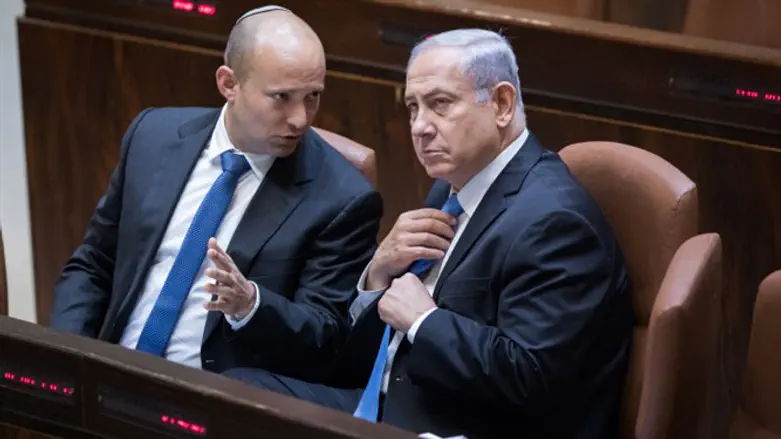
The government faced no less than four proposals by opposition MKs Tuesday evening to dissolve the Knesset, as a coalition crisis sparked over draft exemptions for yeshiva students heads towards a critical juncture.
Since February, Prime Minister Netanyahu has faced an ultimatum levelled by haredi lawmakers who demand government backing for a bill proposed by Shas MK Yoav Ben Tzur which would enshrine in Israel’s Basic Laws Torah study as a national value, thereby protecting exemptions for full-time yeshiva students from the Supreme Court.
The court has struck down multiple pieces of legislation providing exemptions, including a 2017 ruling against a 2015 amendment which repealed a 2014 law aimed at reining in the open-ended draft deferments which have been provided since the late 1970s.
Since February, haredi lawmakers have threatened to block passage of the 2019 state budget, which by law must be passed by the end of March, if the draft law is not passed first. Failure to pass the spending bill would force snap elections, forcing Israelis to head to the polls for the third time in five years.
On Sunday, Netanyahu met with Deputy Health Minister Yaakov Litzman (United Torah Judaism), and ultimately succeeded in winning haredi backing for a compromise arrangement, under which the government would approve the draft bill in the Ministerial Committee for Legislation and bring the bill up in the Knesset plenum for the first of three readings. The bill would be brought up for its second and third readings during the Knesset’s summer session.
Following the agreement, haredi lawmakers permitted the 2019 budget bill to be voted on and passed by the Knesset Finance Committee, chaired by UTJ MK Moshe Gafni.
While Netanyahu appears to have mollified his haredi coalition partners, who with a combined 13 seats could topple his 66-seat majority government, the deal reached Sunday angered Defense Minister Avigdor Liberman’s Yisrael Beytenu party, which opposes maintaining open-ended exemptions for yeshiva students and has vowed to vote against the haredi-backed draft law.
Yisrael Beytenu has also threatened to bolt the government if the bill is passed.
“If the law is passed in its current form – we’re out,” Yisrael Beytenu MK Oded Forer told Channel 10on Monday.
“We won’t let our hands be tied when it comes to security matters. We’ll leave the coalition if the bill is passed in the second and third readings.”
While the departure of Liberman’s five-seat faction would not deny Netanyahu the 61-seat majority he needs to maintain his government, it would leave the coalition hard-pressed to continue. Netanyahu himself ruled out the possibility of continuing his government with a bare-minimum of 61 MKs.
On Monday, the Ministerial Committee for Legislation approved the draft bill, granting coalition backing, despite a nay vote by Yisrael Beytenu’s Sofa Landver, who serves as Minister of Immigration.
Landver appealed the committee’s decision, however, forcing the committee to hold a hearing on the matter at 6:00 p.m. Tuesday evening, just after the Knesset hears arguments on the four motions to dissolve itself.
At 8:00 p.m., the Knesset will vote on the haredi-backed draft bill’s first reading, before opening discussion on the 2019 state budget, with a vote on the budget expected Wednesday.
Netanyahu has threatened to fire Landver from the government if she votes against Yoav Ben Tzur’s draft bill. But Defense Minister Avigdor Liberman has promised the his party’s entire five-member delegation will vote with the opposition against the bill.
“Everyone in Yisrael Beytenu will vote unanimously against the bill,” said Liberman.
Yet Liberman also signaled his willingness to remain in the coalition if Netanyahu allows Landver to retain the Immigration portfolio and if modifications are made to the draft bill by the time it is brought up for a final vote this summer.
“If Minister Landver isn’t fired from the government, and if the security establishment can put together a new bill for approval in the Knesset in this summer, then we can avoid early elections.”
